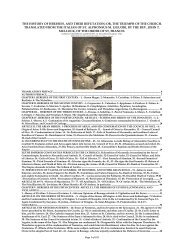The Writings of St. Francis of Assisi - + Saints' Works
The Writings of St. Francis of Assisi - + Saints' Works
The Writings of St. Francis of Assisi - + Saints' Works
You also want an ePaper? Increase the reach of your titles
YUMPU automatically turns print PDFs into web optimized ePapers that Google loves.
THE WRITINGS OF ST. FRANCIS OF ASSISI<br />
road. · And when the necessity has arisen, let them go about for alms. · And let them not be<br />
ashamed but rather let them remember, that Our Lord Jesus "Christ, the Son <strong>of</strong> the living God"<br />
(Jn 11:27) Omnipotent, "set" His "face like flint" 396 (Is 50:7), nor was He ashamed; · and He was<br />
poor and a guest and lived by alms, He and the Blessed Virgin and His disciples. · And when<br />
men shame them and are not willing to give them alms, let them return thanks to God on that<br />
account; that because <strong>of</strong> (this) shame they shall receive great honor before the tribunal <strong>of</strong> Our<br />
Lord Jesus Christ. · And let them know, that shame is imputed not to those who suffer it, but to<br />
those who bring it upon (others). · And alms are the inheritance and justice, which are owed to<br />
the poor, (and) which Our Lord Jesus Christ acquired for us. · And the friars, who labor in<br />
acquiring these, shall have a great wage and will make those (who) grant (these) pr<strong>of</strong>it and<br />
acquire (merit); because all things that men leave in the world will perish, but because <strong>of</strong> the<br />
charity and alms, which they give, they shall have a reward from the Lord.<br />
And let one without fear 397 manifest to the other his own need, so that (the latter) may<br />
find for him what is necessary and minister (it to him). · And let him love (dilectio) and nourish<br />
his brother, as a mother loves and nourishes her son (cf. 1 Th 2:7), in the manner 398 that God<br />
bestows the grace upon him. · And "let him who does not eat, not judge him (who is) eating"<br />
(Rm 14:3b).<br />
And whenever necessity has overtaken them, let it be licit for all the friars, wherever they<br />
have been, to use all foods, 399 which men can eat, just as the Lord says <strong>of</strong> David, who "ate the<br />
bread <strong>of</strong> proposition" (cf. Mt 12,4), "which was not licit to eat except for the priests" (Mk 2:26). ·<br />
And let them remember, what the Lord says: "Attend moreover to yourselves lest perchance your<br />
hearts grow heavy with stupor and drunkenness and the cares <strong>of</strong> this life and there overtake" you<br />
"that unexpected day; · for like a trap it shall spring upon all, who sit upon the face" <strong>of</strong> the globe<br />
"<strong>of</strong> the earth" (cf. Lk 21:34-35). · Also in the same manner, in times <strong>of</strong> manifest necessity let all<br />
the friars do concerning their needs, as the Lord bestows the grace upon them, because 'necessity<br />
has no law.' 400<br />
Chapter X<br />
On the sick friars<br />
If any <strong>of</strong> the friars has fallen into infirmity, wherever he has been, let the other friars not<br />
send him away, 401 rather let one or very many <strong>of</strong> the friars, if it is necessary, be appointed to<br />
396 lit. petram durissimam, "the hardest rock," a thing fit to be struck.<br />
397 cf. RegB VI,9.<br />
398 <strong>The</strong> succinct Latin phrase in quibus, translated here as "in the manner" may also be translated<br />
"in those (things) that," "in regard to those whom", "at those (times) that", "in those (cases) that."<br />
399 During times <strong>of</strong> fast, the friars abstained from eating meat, lard, fruit and other rich foods.<br />
400 Normally the friars could only conduct their affairs with the permission <strong>of</strong> their superiors, in<br />
accord with their vows <strong>of</strong> obedience and poverty. <strong>St</strong>. <strong>Francis</strong> here explicitly grants a<br />
dispensation, as necessity demands. However, this dispensation is dropped from the Regula<br />
Bullata [RegB] because it is a general principle in ecclesiastical law, and thus need not be<br />
mentioned in a rule. On this principle see Decretum Gratiani, P. II. C. q. 1 the gloss before c. 40;<br />
William <strong>of</strong> <strong>St</strong>. Thierry Commentatio ex Bernardo 33: PL 184,433; and compare <strong>St</strong>. Bernard,<br />
Liber de praecepto et dispensatione, ch. 5; PL 182,867.<br />
401 It was and still is the custom in many religious orders to dismiss a member who becomes too<br />
Page - 90













